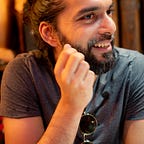Karachi for the holidays
Published in
3 min readDec 25, 2015
I’ve found myself back home in Karachi after a very very long journey from Freetown (which involves cabs, boats, and yes, planes too).
The flight was fairly routine — right up until I got on my last leg of the flight from Dubai to Karachi. Then, mysteriously, something switched on.
- As soon as the doors to our plane shuttle closed, an old man panicked and realized he really needed to go to the bathroom. He hadn’t flown much before and didn’t believe there were bathrooms on the plane. In his panic he tried to leave the shuttle while it was driving while fellow passengers (including myself) tried to calm him and have him sit down. This lasted a good fifteen minutes. Bladder frenzies be crazy.
- Seat trading begins as soon as we got on the Fly Dubai flight. This certainly happens in other flights too, but not to the extent I’ve seen in flights going to Karachi. This is a full on stock exchange type experience (okay a very mellow stock exchange if you can picture that). Sometimes the trade is initiated with a question “can I offer my middle seat for your aisle/window?” to which I’ve found, interestingly people don’t always say no.
- The interpersonal judgy assessments kick in. This is both stark and obvious whenever random Pakistanis get together in a crammed space. Everyone scopes the other out and assesses the ‘good family index’, the ‘burger index’, ‘the religious index’, ‘the how far is my son/daughter from your age index’, ‘the maila index’, ‘how likely to unabashedly spit on the street index’, and the more composite ‘social class index’.
- The health post at the airport, set up by the Ministry of Health, didn’t bother to ask anyone where they were coming from. In my case, given that I’d been in Sierra Leone and Liberia recently, they really should have. Just to at least check if I’d had any symptoms.
- When I told the immigration officer where I was coming from, her eyes lit up POSITIVELY and she said that she’s heard Sierra Leone is beautiful and wanted to know what I think of it. Then she proceeded to ask how the people are doing after the Ebola outbreak. THEN she said ‘Karachi ki turha mujhe lagta hai ke Sierra Leone ke log bhi bohot himmat walay hain’ (It seems to me that the people of Sierra Leone have the same kind of will/resilience as the people of Karachi).
- My cab driver gave me a detailed update on how the National Action Plan is biting the posteriors of the local ‘Jamaats’ long after they had signed on to it and a full and thorough breakdown of the politics of the PML-N, PPP, MQM, PTI, and the non-state folk in Sindh. The driver was an old man with a prayer cap on and a magnificent white beard who was proud that Karachi had managed to diminish the Taliban’s presence.
- He also spoke about the idiocy of Nasir Khuhro though recognized that this was a case that was ‘found out about’ and gained fame fast.
- He further shared his perspective on increasing inequality (comparing the increasing wealth of the top 20% of the population with the rest), experienced consumer price index (how the things his communities need and buy are getting pricier than the government believes), and about constantly negotiating with unrelenting passengers from the airport who don’t buy into the fixed rate service (which I didn’t at first either until I requested their tariff).
- (Holy crap. That was awesome! Riveting conversation!)
- Karachi looked and felt amazing that morning. There were new skyscrapers (at about a 15 floor minimum threshold). Others under construction. The refreshing winter wind, the buses all had these paper mache flowers on them to complement their epic designs, there were wonderful paintings under the bridges — all in all the city just felt incredibly alive. What a morning.
- Lastly, Jubilee, a locally produced chocolate bar that was probably the most prevalent in the city had faded out of the market a decade ago. Now it’s back! With three flavours!
Finally, I hadn’t told my parents I was coming. That was definitely a fun ending.
Like this:
Like Loading…
Originally published at sparkthemedian.wordpress.com on December 25, 2015.
